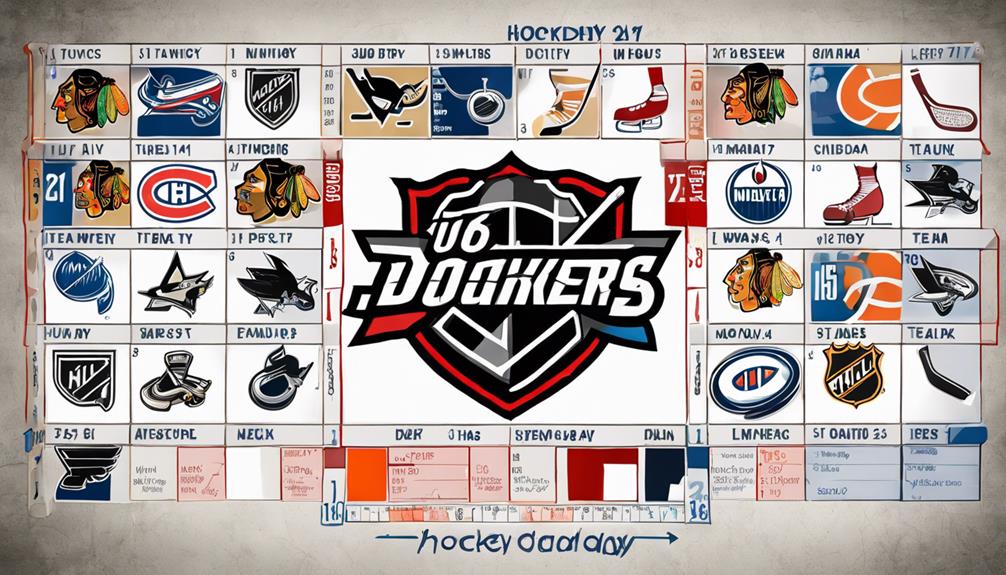The number of games in an NHL season holds a significant role in shaping the competition, player performance, and overall fan engagement. Understanding the intricacies of how many games are played each season unveils a broader perspective on the league's dynamics, strategy, and endurance required by teams.
Delving into the factors that influence this figure sheds light on the unique challenges and opportunities that come with a packed schedule. As we explore the nuances of game count in the NHL season, we uncover a world where every match contributes to the tapestry of professional ice hockey, making each game a crucial piece of the season puzzle.
NHL Regular Season Length
The NHL regular season spans over several months, consisting of a specific number of games to determine playoff qualifications. The regular season duration typically starts in early October and runs through to April, with each team playing 82 games.
The game scheduling dynamics are meticulously planned to ensure a balance between home and away games for all teams. This scheduling strategy aims to provide each team with an equal opportunity to showcase their skills in front of their home crowd while also facing challenges on the road.
The number of games in the regular season allows for a comprehensive evaluation of each team's performance, leading to the selection of the top teams for the playoffs based on their season-long consistency and success.
Breakdown of Home and Away Games
Equally distributing games between home and away venues is a crucial aspect of NHL scheduling strategy. This balance not only ensures fair competition but also considers travel logistics for teams and fan attendance. Teams often travel long distances between games, so a well-planned schedule with adequate rest periods can impact player performance and reduce the risk of injuries.
Moreover, the distribution of games between home and away venues plays a significant role in maintaining fan engagement. Home games draw local supporters, creating a vibrant atmosphere that energizes players. On the other hand, away games provide an opportunity for fans from different regions to experience live matches.
Striking a balance between home and away games is essential for the overall success and sustainability of the NHL season.
Total Number of Games Played
In the NHL season, teams play a total of 82 regular-season games. These games are crucial in determining the standings and playoff seedings. Here are some key points related to the total number of games played:
- Regular Season Length: The NHL regular season typically spans from October to April, with each team playing 82 games.
- Game Cancellations, Rescheduling: Occasionally, games may be canceled or rescheduled due to unforeseen circumstances like severe weather conditions or other logistical issues.
- Increased Seasonal Game Attendance: The 82-game schedule allows fans ample opportunities to attend games throughout the season, supporting their favorite teams.
- Impact on Team Performance: The number of games played can impact player fatigue, injuries, and overall team performance as the season progresses.
NHL Season Structure Overview
Navigating through the NHL season structure provides a comprehensive view of how teams progress and compete within the league. The NHL season is structured around the regular season games where each team plays 82 games, facing opponents from both within their division and across the league.
This setup intensifies division rivalries as teams battle for playoff berths. The playoff format follows the regular season, with the top teams from each division securing a spot, along with wild card entries based on point totals.
Division rivalries often come to a head in the playoffs, adding an extra layer of competitiveness to the games. Understanding the NHL season structure enhances fans' appreciation of the strategic matchups and fierce competition that unfold throughout the season.
Impact of Playoffs on Game Count
The impact of playoffs on the total game count in the NHL season significantly alters the dynamic of competition and adds a heightened level of intensity to the postseason matchups.
- Playoff Format: The NHL playoffs consist of four rounds where teams compete in best-of-seven series to advance.
- Extended Game Scheduling: With each round potentially lasting seven games, the playoffs can significantly increase the number of games played.
- Intensity and Excitement: The win-or-go-home nature of playoff games elevates the stakes and creates a thrilling atmosphere for players and fans alike.
- Impact on Fatigue: The extended playoff series can impact player fatigue and recovery times, influencing team strategies and performance.
The playoffs not only determine the ultimate champion but also shape the narrative of the NHL season each year.
Historical Changes in Game Schedule
Following the dynamic evolution of game scheduling in the NHL, historical changes in the number of games played per season have shaped the league's competitiveness and structure over time.
Game day traditions, such as the long-standing tradition of the Montreal Canadiens hosting games on Saturdays, have been intertwined with the adjustments in the NHL schedule.
These changes have not only impacted the frequency of matchups but also influenced the development of historical rivalries like the fierce battles between the Boston Bruins and the Montreal Canadiens.
The league's expansion and the integration of new teams have further necessitated modifications to the game schedule, highlighting the NHL's commitment to balancing tradition with innovation while maintaining the essence of its historical rivalries.
Frequently Asked Questions
How Are NHL Teams Assigned Their Schedule of Games Throughout the Season?
NHL teams' schedules are crafted with precision, considering travel logistics and game locations. The balance between rest and game intensity is crucial for peak performance. This careful planning ensures a fair and competitive season for all teams.
Are There Any Specific Rules or Regulations Regarding the Scheduling of Back-To-Back Games for Teams?
In the NHL, regulations exist to minimize player fatigue and maintain competitive balance when scheduling back-to-back games. Factors like travel logistics and recovery time are carefully considered to ensure teams have fair opportunities without compromising player well-being.
How Do NHL Teams Handle Scheduling Conflicts With Other Events Happening at Their Home Arenas?
When facing event conflicts, NHL teams prioritize games by working closely with arena management to navigate through scheduling logistics. Arena availability is carefully considered, ensuring seamless coordination between the team's season schedule and other events at the venue.
Are There Any Restrictions on How Many Games Can Be Played in a Week or Month?
In professional sports leagues like the NHL, managing player workload is crucial for minimizing injury risk, maintaining competitive balance, and effective fatigue management. Ensuring a balanced schedule that considers these factors is key to a successful season.
How Does the NHL Manage Rescheduling Games That Are Postponed Due to Unforeseen Circumstances?
Managing game cancellations in the NHL involves a meticulous dance of rescheduling. When unforeseen circumstances strike, the league swiftly adjusts, balancing team schedules while ensuring fair play. This intricate process showcases the NHL's adaptability and commitment to maintaining the integrity of the game.









